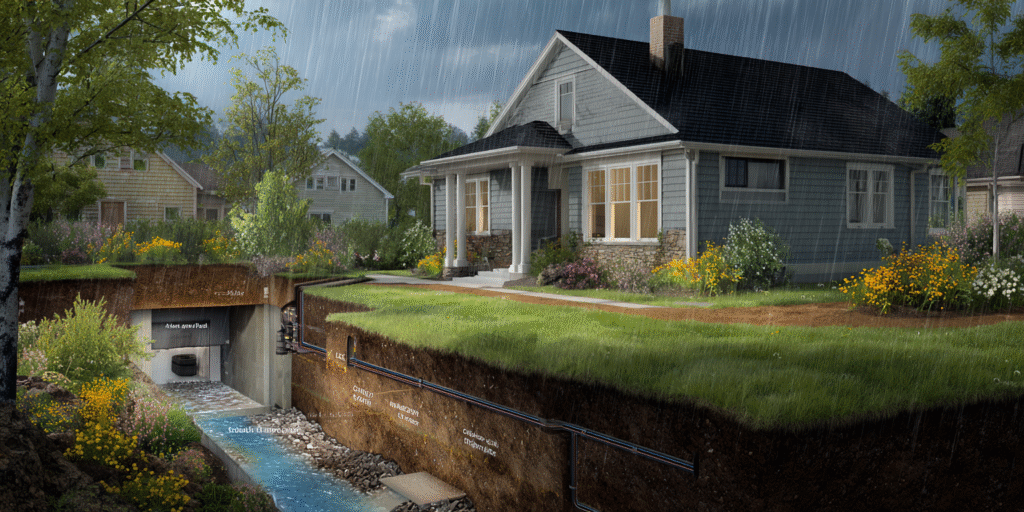When storm clouds gather and heavy rains pour down, homeowners face more than just wet weather – they confront potential threats to their property’s critical infrastructure, particularly their sewer systems. These essential networks, designed to handle routine water flow, can become severely strained during intense rainfall events, leading to complications that affect both individual homes and entire neighborhoods.
Understanding the relationship between heavy rains and sewer systems is crucial for every homeowner. Modern sewer systems, while robust, have specific capacity limitations that nature occasionally challenges. During severe weather events, these systems must manage not only the usual household wastewater but also substantial amounts of stormwater that can overwhelm even well-maintained infrastructure.
The impact of heavy rains on residential sewer systems extends beyond simple flooding. These weather events can trigger a cascade of problems, from minor inconveniences to major structural damages. The pressure exerted on sewer systems during storms can lead to backed-up pipes, overflowing manholes, and in worst-case scenarios, sewage entering homes through basement drains and other low-lying access points.

The process of sewer system overload during heavy rains involves multiple factors working simultaneously. When rainfall intensity exceeds the soil’s absorption capacity, excess water becomes runoff, flowing into storm drains and sewer systems. This sudden surge of water can quickly exceed the designed capacity of these systems, leading to what experts call hydraulic overload.
Municipal sewer systems typically handle two types of water: sanitary sewage from homes and businesses, and stormwater from rain events. In older cities, these systems might be combined, making them particularly vulnerable during heavy rains. When these systems become overwhelmed, they can’t effectively transport water away from residential areas, resulting in backups and flooding.
1. Volume and Intensity: Sudden, intense rainfall delivers large amounts of water in short periods, overwhelming system capacity.
2. Ground Saturation: When soil becomes saturated, it cannot absorb additional water, increasing surface runoff.
3. Infrastructure Age: Older sewer systems may have reduced capacity due to deterioration, tree root intrusion, or accumulated debris.
4. Urban Development: Increased pavement and reduced green space limit natural water absorption, directing more runoff into sewer systems.
Recognizing the warning signs of an overwhelmed sewer system can help homeowners take prompt action to protect their property. Early detection often means the difference between minor inconvenience and major damage. Here are key indicators that your sewer system is under stress:
1. Unusual Sounds
2. Visual Indicators
3. Operational Issues
4. Environmental Signs
Strategies for Prevention and Mitigation
Protecting your home from sewer system overload requires a comprehensive approach combining both immediate actions and long-term solutions. Here are essential strategies every homeowner should consider:
Immediate Protective Measures:
1. Install Backwater Valves
2. Maintain Proper Drainage
3. Regular Maintenance
Long-term Solutions:
1. Landscape Modifications
2. Structural Improvements
3. Professional Assessments
Taking proactive steps to protect your home’s sewer system from heavy rains is essential for maintaining your property’s value and your family’s comfort. Understanding the risks, recognizing warning signs, and implementing appropriate preventive measures can significantly reduce the likelihood of serious sewer-related problems during severe weather events.
The key to successful protection lies in regular maintenance and prompt attention to potential issues. Don’t wait for problems to become severe before taking action. Regular inspections, maintenance, and updates to your home’s sewer system can prevent costly repairs and protect against weather-related challenges.
Remember that professional expertise is crucial in maintaining and protecting your sewer system. Licensed plumbers have the knowledge, tools, and experience to properly assess your system’s condition and recommend appropriate solutions. If you’re concerned about your home’s vulnerability to heavy rains, don’t hesitate to call for an appointment with a qualified professional who can evaluate your specific situation and provide targeted solutions.
By staying vigilant and maintaining your sewer system properly, you can face future storms with confidence, knowing that your home is protected against sewer system failures. The investment in prevention is always more cost-effective than dealing with the aftermath of a serious sewer system failure.